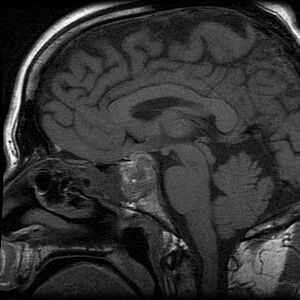Apoplexy facts for kids
Apoplexy (from Ancient Greek [ἀποπληξία (apoplexia)] Error: {{Lang}}: text has italic markup (help), meaning 'a striking away') refers to the rupture of an internal organ and the associated symptoms. Informally or metaphorically, the term apoplexy is associated with being furious, especially as "apoplectic". Historically, it described what is now known as a hemorrhagic stroke, typically involving a ruptured blood vessel in the brain; modern medicine typically specifies the anatomical location of the bleeding, such as cerebral apoplexy, ovarian apoplexy, or pituitary apoplexy.
Contents
How does it happen?
Apoplexy, or what we now call a stroke, can happen in a couple of main ways:
- Blocked Blood Vessel: Imagine your brain needs a constant supply of fuel, like a car. This fuel comes in the form of blood, which carries oxygen and other important things. Blood travels to the brain through special roads called blood vessels. If one of these roads gets blocked, like by a tiny clot, the brain cells that don't get enough blood can get damaged. This is like a power outage in part of your brain.
- Bleeding in the Brain: Sometimes, a blood vessel in the brain can break or leak. This is like a water pipe bursting. The blood can then put pressure on the brain and damage the cells around it.
What happens when someone has apoplexy?
When someone has apoplexy, or a stroke, it can affect them in different ways, depending on which part of the brain is affected. Some common things that might happen include:
- Weakness or Numbness: They might feel weak or numb on one side of their body. Imagine one of your arms or legs suddenly feels very heavy or like it's asleep.
- Trouble Speaking: It might be hard for them to talk or understand what other people are saying. It's like trying to speak a language you don't know very well.
- Vision Problems: They might have trouble seeing clearly or have double vision.
- Balance Problems: They might feel dizzy or have trouble walking.
- Headache: Sometimes, they might have a very bad headache.
Why don't doctors use the word "apoplexy" anymore?
Doctors don't use the word "apoplexy" much anymore because it's not very specific. It's like saying you have a tummy ache – it could be lots of different things! Doctors now have ways to figure out exactly what's happening in the brain, so they can use more precise terms like:
- Ischemic Stroke: This is when a blood vessel is blocked.
- Hemorrhagic Stroke: This is when a blood vessel bleeds.
- Transient Ischemic Attack (TIA): This is like a mini-stroke where the blood flow is blocked for a short time.
By using these more specific terms, doctors can better understand what's happening and give the right treatment.
See also


